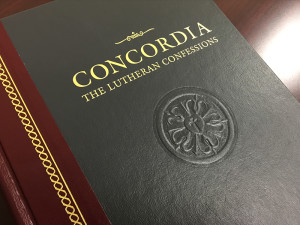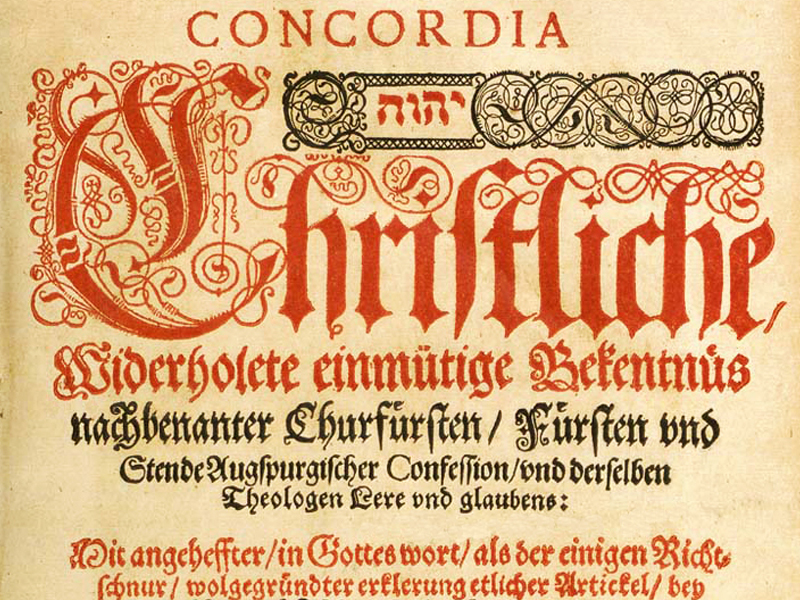by Rev. Mark Bestul
The last single-issue article of the Formula of Concord, Article XI is unique in that it was largely preemptive. While acknowledging that no major struggle had yet erupted over this article of faith, the writers of the Formula were aware of small skirmishes and penned the article wisely foreseeing that poor teaching on the issue could rear its ugly head.
So, preemptively, Article XI confesses the right “understanding” of God’s foreknowledge and election. Certainly, no one can actually understand God’s will and ways as if analyzing the work of a colleague; but, this article confesses God’s foreknowledge and election with a clarity that defends against the Calvinist notion that seeks to rationalize God’s hidden will that results in believing in “double predestination” (the teaching that some are predestined to eternal life, while others are predestined to eternal condemnation). Such fatalistic notions are based on a flawed understanding of the relationship between “foreknowledge” and “election,” so Article XI begins there.
The article’s very title distinguishes “foreknowledge” and “election.” We ought not think these two terms reference the same thing. Just because someone foreknows something doesn’t mean he elects or purposes it. For example, a father who gives his newly-licensed teenager the car keys has a pretty good idea he’ll end up with higher insurance premiums in the near future; that doesn’t mean the father elects, wills, or purposes those higher premiums.
Thus, the confessors write, “First we must carefully note the difference between God’s eternal foreknowledge and his eternal election of his children to eternal salvation.”[i] Foreknowledge (praescentia) “applies to all creatures, good and evil,” but election (praedestinatio) applies “only to the children of God.”[ii]
This has important ramifications. If election applies only to the children of God, then there is no “double predestination” and one is disqualified from using the issue of election to try and determine who is a child of God and who isn’t (as if one could reason, “I can tell who is saved because I can determine who is the ‘elect’”). Unlike foreknowledge, election has only one audience; it is to be employed only among God’s children as comfort to the children of God in times of doubt or affliction.
Read Romans 8:23-39 and notice how often Paul uses the pronouns “we” and “us” as he speaks to the Christian… that, “If God is for us, who can be against us?… Nothing can separate us from the love of God in Christ Jesus, our Lord.” (Romans 8).

Secondly, we ought note important misunderstandings about these two terms, “foreknowledge” and “election”, that the confessors seek to correct: (1) foreknowledge does not imply cause. Yes, God foreknows evil, but this does not mean he causes evil. A ‘good Samaritan’ may give a hungry man a sandwich instead of money; if the poor man refuses the sandwich because he expected money, this does not indict the good Samaritan! Likewise, God foreknows who will be condemned because they reject the Gospel, but He does not thereby elect them to be condemned. God desires all men to be saved. (2) Election does not imply God chooses you for salvation apart from/before the promise of Christ crucified. Where Calvinist teaching implies that ‘God chooses you unto election, then Christ dies exclusively for the elect,’ the Formula rightly confesses that election means God purposes to save you and has set up an entire plan of salvation that carries out his intention and counsel. This eternal intention of God is revealed to us in the person of Christ, so that “the eternal election of God should be considered in Christ and not apart from or outside of Christ.”[iii]
Read paragraphs SD 15-24. Notice how the ‘plan’ of election, summarized through eight points, sounds like a walk through the Small Catechism! Indeed, our baptismal life is the playing out of God’s eternal plan and election!
Based on this truth and God’s intention and purpose, the Confessors remind the Christian to search only the revealed will of God, who reveals His will through means that give us Christ. These means include the Word[iv] and the Sacraments[v]. And, because many reject the means, they reject God’s purpose and will. Thus “many are called, few are chosen,” not because God elects the many unto condemnation, but because the many reject the calling to the Gospel through the means of grace.[vi]
Where this is understood rightly, what comfort this article brings!
Read paragraphs 43-50 and find the comforts and consolations articulated by the Confessors—comforts that are yours in this article of faith!

And, because this is so comforting, who would not wish it to be theirs? And, if you do:
Whoever would be saved should not trouble or torment himself with thoughts about God’s secret counsel, about whether he also is elected and ordained to eternal life…. But [he] should hear Christ, who is the Book of Life, and hear about God’s eternal election to eternal life for all of His children.[vii]
Is this not the reason that the Jews, the “chosen” of God, were not saved? They rejected the Christ who is the Book of Life.
Read Romans 9-11, and consider how Paul addresses the hypothetical questions about God’s election, especially as it plays out among “Jews vs. Gentiles.”
Thus, when the Scriptures declare that God “hardens” hearts (such as Pharaoh’s), this is not to imply that God hardened hearts that would otherwise believe but now “could not” because God refused to allow them! (Have you ever heard someone say, “I really want to believe, but I can’t,” as if it’s God’s fault?!). Rather, God hardens by removing the Gospel from those who have been stubborn against it. The visitation of God’s grace is not a permanent member in the home, and He removes it from those who repeatedly refuse it, thus hardening what they have already begun to harden.
But, for those who desire the assurance that God will save them, that they are “the elect of God,” they ought receive the great comfort that “[if God spared] not his own Son, but gave him up for us all, how will he not now with him graciously give us all things? Who shall bring any charge against God’s elect? It is God who justifies. Who is to condemn? Christ Jesus is the one who died—more than that, who was raised—who is at the right hand of God, who indeed is interceding for us. Who shall separate us from the love of Christ?” (Romans 8:32-35a).
Thanks be to God for this comforting article of God’s eternal foreknowledge and election!
The Rev. Mark C. Bestul is pastor of Calvary Lutheran Church in Elgin, Ill.
[i] Solid Declaration XI, 4.
[ii] Ibid.
[iii] Ibid., 65.
[iv] Ibid., 29, 33.
[v] Ibid., 37.
[vi] Ibid., 40-42.
[vii] Ibid., 70.
